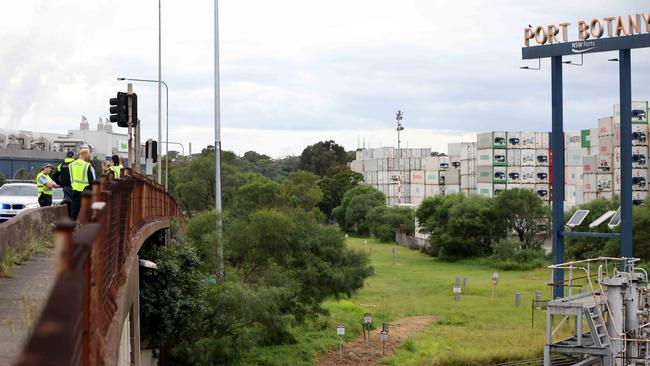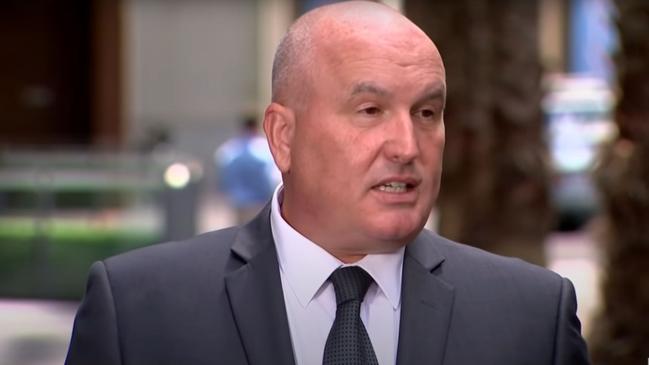Blockade Australia protester Max Curmi to face four months in prison
The Blockade Australia climate change protester responsible for the Port Botany shut down on Friday has been sentenced to time behind bars.

NSW
Don't miss out on the headlines from NSW. Followed categories will be added to My News.
The Blockade Australia activist who climbed a crane in Port Botany on Friday has been sentenced to four months in prison.
Max Curmi, 26, was accused of suspending himself from a 60m-high crane at the port. It took police five hours to remove him from the machinery, before he was charged with endanger person on railway, remain in a waterside restricted zone when not authorised, refuse to comply with direction, encourage the carrying on operation for commission of crime, and risk safety of another by climbing building/structure.
The climate change protester was sentenced at Waverley Court on Sunday after being arrested and taken into custody following the protest on Friday.
The incident was the eighth day of action from the climate change activist group after a week of disruption caused at Port Botany.

Two climate activists have also been banned from associating with Blockade Australia after allegedly undertaking, and broadcasting, dangerous stunts which wreaked havoc on operations at Port Botany.
Despite Transport Minister David Elliott labelling the protesters as “dopes” and asking the courts to throw the book at them, Sharron Hodge, 62, and Emma Dorge, 25, were granted bail by a magistrate this weekend.
Hodge, Dorge, and Max Curmi, 26, from climate group Blockade Australia, targeted the port three times on Friday, allegedly hanging themselves off a bridge, climbing atop a train and suspending themselves off a high crane.
Each of the co-accused streamed their alleged acts on the Blockade Australia Facebook page, which has almost 6000 followers.
Despite police arguing against Hodge and Dorge’s release out of fear they would commit the same offences again — or risk the safety of themselves, the community and police — they were granted bail after spending the night in police cells.

“This is a blatant disregard for the safety of others,” police prosecutor Sergeant Emery told the court.
“These were well planned-out and organised acts and, according to (the police case), there were further intentions to commit similar acts by encouraging others to take part in their cause.”
Magistrate Andrews agreed to release them however, on the conditions they not communicate with any members of Blockade Australia or take part in any unlawful protests.
They were also banned from entering a 10km radius of Port Botany or any rail stations, unless for travel.
Hodge, 62, who travelled more than 330km from her home near Taree to take part in the protest, said she “would not break those rules”.
The grandmother is facing three charges, including enter enclosed land not prescribed premises without lawful excuse, endanger safety of person on railway, and cause obstruction to railway locomotive or rolling stock, after allegedly climbing on top of a train at Marrickville — forcing operations to stop.
Dorge, a serial protester who has been before the courts in Queensland for similar activism, told the court she was “not being treated very well or fed properly” during her stay in police custody.

The teary 25-year-old midwife represented herself in court and was granted bail, despite trying to argue against the non-association order with fellow Blockade Australia members.
As a condition of her bail, she was ordered to return to her mother’s home in Queensland, allowed to return to NSW only for court purposes.
Her alleged antics at Port Botany saw police rescue officers arrest her in a precarious operation after she allegedly suspended herself from a bridge at the port.
She was charged with endanger safety of person on railway, remain on enclosed land not prescribed premises without lawful excuse, refuse/fail to comply with direction, and encourage the carrying on operation for commission of crime. She spent the night on remand in custody.

None of the accused have entered pleas to the charges against them.
Mr Elliott said police were risking their lives to get these protesters down from their precarious positions, adding that he hoped they faced the full force of the law.
“My advice to the judiciary is when police bring a brief, we want to see the maximum sentences handed down because this economy cannot continue to have this sort of disruption as we come out of Covid,” he said.
“My message to the protesters is ‘stop being dopes’, you are really doing yourself a disservice.
“I don’t think anybody is taking notice about what they are protesting about.”
When asked if Sydneysiders should expect the disruptions to continue, Mr Elliott said it was impossible for police to be across the “literally tens of thousands of kilometres of track and transport corridors”.
Got a news tip? Email weekendtele@news.com.au


